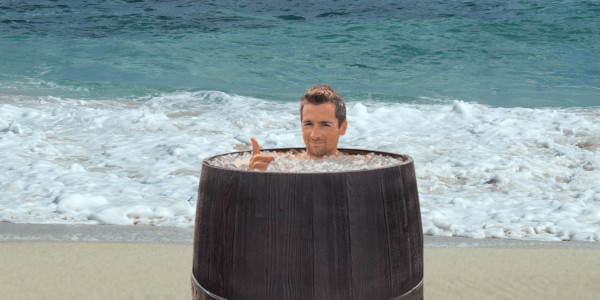In our modern lifestyle, we tend to avoid discomfort and seek comfort in warm environments with readily available food. However, our ancestors adapted to the cold over time, especially during the winter season. While we can easily counteract the cold by adjusting thermostats, there is a growing body of research suggesting that exposing ourselves to cold water immersion can positively impact our genes and overall health. This article delves into the intriguing research surrounding cold water immersion, its benefits, and how it can affect our genetic expression.
Cold Water Immersion: Uncomfortable yet Effective
To experience the benefits of cold therapy, it is important to embrace discomfort. Even just 11 minutes per week can yield significant advantages. Cold water immersion can be achieved through various means, such as using a cold water immersion tank, taking cold showers, or swimming in cold pools or natural bodies of water.
Cold Therapy vs. Warm Therapy
Comparing cold therapy to warm therapy, such as hot showers, reveals that cold therapy offers greater benefits. Although it may initially be uncomfortable, this discomfort leads to numerous positive effects on the body.
Making Cold-Water Immersion Easier
If the idea of cold-water immersion feels daunting or you have a low tolerance for cold temperatures, it could be an indication that your body needs more B vitamins. B vitamins can help increase your tolerance to extreme temperatures, making cold therapy more manageable. Consider incorporating B vitamin-rich foods into your diet or taking supplements.
Cold-Water Immersion Benefits
Cardiovascular Health: Cold therapy can decrease the ratios of APO a to APO B, which are proteins associated with cardiovascular function. Additionally, it reduces homocysteine levels and oxidative stress while decreasing cortisol and ACTH (the hormone that controls cortisol).
Enhanced Immune System: Cold therapy strengthens the immune system by decreasing antibody levels and reducing the risk of upper respiratory tract infections. Swimmers, in particular, benefit from both cardiovascular advantages and decreased respiratory tract infections.
Mental Well-being: Cold water immersion has been found to decrease depression, acting as a natural antidepressant. It also increases mental resilience, enhancing your ability to adapt to stress.
Inflammation and Pain Reduction: Cold therapy can alleviate inflammation, decrease muscle soreness, and reduce pain levels.
Accelerated Recovery: Engaging in cold therapy after physical exertion or athletic events can expedite recovery.
Anti-Carcinogenic Potential: Cold therapy has been linked to inhibiting tumor growth, possibly due to the activation of brown fat, which consumes glucose—a primary fuel source for cancer cells.
How Cold-Water Immersion Affects Your Genes
Cold therapy also influences gene expression, potentially unlocking a range of benefits:
1-Mitochondrial Biogenesis: Activation of the PGC-1 Alpha gene promotes the growth of mitochondria, enhancing metabolism and oxygen generation.
2-Angiogenesis: Cold therapy increases the expression of the VEGF gene, leading to the production of new blood vessels, thereby improving circulation.
3-Enhanced VO2 Max: Cold therapy activates the PPAR gamma coactivator 1-alpha (PGC-1α) gene, which can increase an individual’s VO2 max—the maximum amount of oxygen a person can utilize during exercise.
4-Protein Aggregation Prevention: Cold therapy promotes the expression of the PSME1 gene, aiding in the recycling of damaged proteins and reducing their accumulation.
5-Antioxidant Production: Cold therapy increases the expression of genes associated with the production of glutathione—an essential liver antioxidant that aids in detoxification.
6-Stress Tolerance: Cold therapy activates the ACTN3 gene, which contributes to increased resistance and mental resilience to stress.
7-Cellular Survival and Anti-Inflammatory Effects: Cold therapy promotes the expression of the RBM3 and CIRP genes, resulting in improved cell survival, DNA stability, enhanced protein synthesis, reduced inflammation, and increased antioxidant activity.
Conclusion:
Cold water immersion and cold therapy offer a multitude of health benefits, ranging from cardiovascular improvements and immune system strengthening to mental resilience and anti-inflammatory effects. Furthermore, cold therapy can positively influence gene expression, triggering favorable physiological changes within the body. Remember, starting slowly and gradually increasing exposure to cold therapy is key to reaping its benefits safely. Whether it’s through a dedicated cold water immersion tank or a refreshing cold shower, incorporating cold therapy into your routine could greatly enhance your overall well-being.
